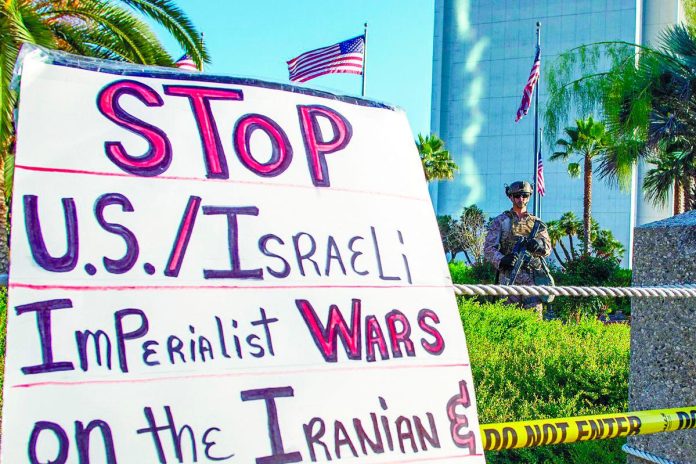IT is difficult to discern exactly what the “big stuff” was that prompted President Donald Trump to leave the G7 summit and return to Washington a day early.
While he did not provide specific details, he did advise the nine million residents of Tehran to “immediately evacuate” their homes – causing mass panic.
Any lingering hopes that the president was returning to the White House to work full time on a ceasefire were dashed when Trump dismissed suggestions to that effect made by the president of France, saying: “I’m not looking for a ceasefire, we’re looking at better than a ceasefire.”
What the president wants – in his words – is “an end, a real end, not a ceasefire” and a “complete give-up” by Iran.
At the same time, however, the president told the world that he had not contacted the Iranians to initiate peace talks in any “way, shape or form”, insisting they “should have taken the deal that was on the table”.
Given that many American diplomats have left the region – and that the USS Nimitz and its carrier strike group are being redeployed from the Pacific – it seems clear that the US government is at least considering the possibility that force, or the threat of it, may be necessary to achieve its strategic objectives.
Trump has long been clear about one of his primary objectives: Iran “just can’t have a nuclear weapon”. On that point, at least, he has the backing of his allies, as endorsed in the G7 communique, which also described Iran as a “source of terror”.
True to his style, weeks ago he tried a bold – if unlikely – diplomatic initiative by arranging direct talks in Rome between American and Iranian officials.
These talks were already stalling before Israel began its bombardment of Iran’s labs, uranium enrichment facilities and other targets – and since then, the US-Iran negotiations have completely broken down.
Yet even now, speculation persists that – under pressure from Israel’s actions and backed by a major US naval taskforce heading towards the Persian Gulf – Trump may try to use this opportunity to achieve a breakthrough deal.
When asked by reporters if he might send Vice President JD Vance and negotiator Steve Witkoff to Iran for this purpose, Trump did not rule it out.
“Peace through strength” is a slogan the president frequently uses, but so far in his presidency, it has seldom worked out in practice. This time, the world must hope, will be different.
If diplomacy fails, Trump could simply allow Israel to continue its efforts to eliminate Iran’s nuclear capabilities and destabilise the theocratic regime, paving the way for its overthrow by the Iranian people.
Israeli Prime Minister Benjamin Netanyahu has made no secret of his wish for “regime change”. He has addressed the “Persian” people directly and posed for a photograph with the exiled son of Iran’s last Shah, who was overthrown by the ayatollahs during the 1979 revolution.
Subcontracting the task of disarming Iran and persuading its people to replace their government with a more palatable, peace-loving alternative – without any direct US involvement – likely holds some appeal for American foreign policy, even though Trump reportedly vetoed an assassination attempt on Iran’s supreme leader.
That carries significant risks, however, which will be apparent to the defence, security and state department officials briefing Trump.
For several weeks, Israel has used the George W. Bush playbook from the last Gulf War to justify its attacks in Iran – a pre-emptive military strike aimed at eliminating the threat of weapons of mass destruction. Like the Americans did with Saddam Hussein, Israel is also presenting regime change as an alternative to destruction and defeat.
A similar ultimatum is now being issued by Trump, with Israeli backing: give up your nukes and you can stay in power. If not…
But the world knows how that Iraqi story ended – a fractured country that fell into civil war and the rise of Isis, an even more brutal and dangerous force than the Baathists.
The collapse of Iran into chaos and civil war would be a far greater disaster for the world than anything that has happened in Iraq, Libya, Syria or Afghanistan, in terms of the consequences of transforming a stable (if malign) state into a failed one.
Iran is in another league of military and political importance. If there was fighting for control of Iran – and the ayatollahs cannot be expected to meekly slink away to their holy places – then that would soon spread to Yemen and restart the horrific proxy war there with Saudi Arabia.
Russia remains Iran’s friend and ally, and relies on its Shahed drones that proved so effective in Ukraine. What would Vladimir Putin do to protect his interests?
If America intervenes or acquiesces in Israel’s escalating campaign, the long-feared regional conflagration between Israel and Iran would no longer remain a private dispute between the two regional superpowers of Israel and Iran. This is especially true given the ongoing involvement of Tehran’s proxy groups – Hezbollah, the Houthi rebels, and above all, Hamas.
The more nations and groups become involved, the more unpredictable events will become, and the harder it will be for America to control them.
Instead of ending far-away wars, this “America First” approach is pulling the country into even more conflicts. That is very much “big stuff” – and carries big risks. – The Independent








